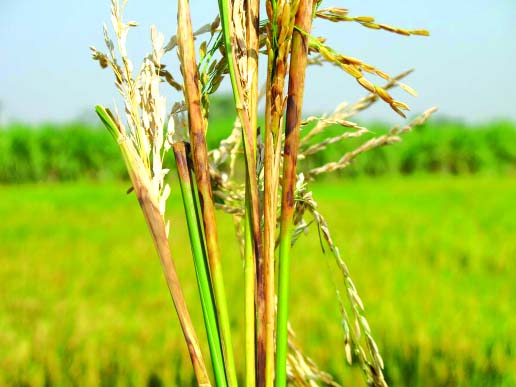
bdnews24.com :
Rice farmers in Thakurgaon fear a disaster in production of IRRI and Boro crops due to blast, one of the most destructive diseases of paddy farms.
New fields of rice in Nargun, Jagannathpur and Begunbari in Sadar Upazila are being affected every day, according to farmers.
Upazila Agriculture Officer Md Anisur Rahman told bdnews24.com that the disease can cause ’80 percent damage to the rice.’?
“It seems that cloudy weather after the sprouting of sheaf, drizzle with wind, high humidity, hot weather during day and cold at night have led the blast to affect the crops,” he said.
He said the authorities were working to find out how many fields were affected. Field-level officials are communicating with the farmers. Leaflets were distributed and announcements were made through loudspeakers to raise awareness among the farmers.
Farmers Jadab Chandra Sharma, Shamsul Haque, Rafiqul Islam, Mohammad Islam and many others said they had to take loans from
NGOs or sell their cattle and fowl to plant the crops.
They said they were concerned because the medicines, prescribed by the authorities, were not working.
“We will be bankrupt considering the condition of the fields,” said one of them. According to Department of Agricultural Extension Deputy Director KM Maududul Islam, Boro crops have been planted in around 60,000 hectare of land in Thakurgaon. The target of production is 241,211 tonnes.
“The blast disease is under control now. We are cooperating with all the farmers whose fields have been affected,” he said.
According to the International Rice Research Institute (IRRI), blast is caused by the fungus Magnaporthe oryzae.
It can affect all above ground parts of a rice plant: leaf, collar, node, neck, parts of panicle, and sometimes leaf sheath.
Rice farmers in Thakurgaon fear a disaster in production of IRRI and Boro crops due to blast, one of the most destructive diseases of paddy farms.
New fields of rice in Nargun, Jagannathpur and Begunbari in Sadar Upazila are being affected every day, according to farmers.
Upazila Agriculture Officer Md Anisur Rahman told bdnews24.com that the disease can cause ’80 percent damage to the rice.’?
“It seems that cloudy weather after the sprouting of sheaf, drizzle with wind, high humidity, hot weather during day and cold at night have led the blast to affect the crops,” he said.
He said the authorities were working to find out how many fields were affected. Field-level officials are communicating with the farmers. Leaflets were distributed and announcements were made through loudspeakers to raise awareness among the farmers.
Farmers Jadab Chandra Sharma, Shamsul Haque, Rafiqul Islam, Mohammad Islam and many others said they had to take loans from
NGOs or sell their cattle and fowl to plant the crops.
They said they were concerned because the medicines, prescribed by the authorities, were not working.
“We will be bankrupt considering the condition of the fields,” said one of them. According to Department of Agricultural Extension Deputy Director KM Maududul Islam, Boro crops have been planted in around 60,000 hectare of land in Thakurgaon. The target of production is 241,211 tonnes.
“The blast disease is under control now. We are cooperating with all the farmers whose fields have been affected,” he said.
According to the International Rice Research Institute (IRRI), blast is caused by the fungus Magnaporthe oryzae.
It can affect all above ground parts of a rice plant: leaf, collar, node, neck, parts of panicle, and sometimes leaf sheath.

